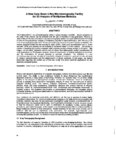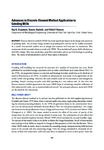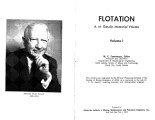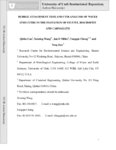|
|
Creator | Title | Description | Subject | Date |
| 1 |
 |
Miller, Jan D.; Lin, Chen-Luh | 3D analysis of particulates in mineral processing systems by cone beam X-ray microtomography | In general, x-ray computed tomographic (CT) techniques are able to provide 3D images of the internal structure of opaque materials in a nondestructive manner. The unique cone beam geometry allows acquisition of all 2D projections with only one rotation of the sample thus providing for fast data acqu... | X-ray microtomography; Liberation; Heap leaching; Exposure analysis; Coal washability | 2003 |
| 2 |
 |
Miller, Jan D. | A new cone beam X-ray microtomography facility for 3D analysis of multiphase materials | Three-dimensional x-ray microtomography offers a unique imaging capability. Spatial resolution on the order of ten microns can be achieved with the use of microfocus x-ray generators. Recently, a state-of-the-art, flexible cone beam x-ray microtomography system has been installed at the University o... | | 2001-01-01 |
| 3 |
 |
Miller, Jan D. | Adsorption mechanisms in nonmetallic activation systems | Adsorption of lead and ferric iron on quurtz and alumina is presented as a function of pH. Only the hydrolyzed species of these metal ions, FeOHt+ and PbOH', adsorb significantly on each of these minerals. Zeta potentials of quartz were measured as a function of pH in the presence of various additio... | Ferric iron; Quartz; Lead; Alumina; Adsorption; pH (Chemistry) | 1970 |
| 4 |
 |
Rajamani, Raj | Advances in discrete element method application to grinding mills | Discrete element method (DEM) has made significant impact in the design and operation of grinding mills. The internal charge motion of grinding balls and ore can be readily examined. As a result, this method enables one to design and examine mill internals via simulation. This manuscript details es... | | 2014-01-01 |
| 5 |
 |
Miller, Jan D. | Agglomeration and magnetic deinking for office paper | Magnet deinking of office paper (OP) is a promising technology for the production of high quality secondary fiber. The technique is possible because a significant portion of the toner in OP furnish has a magnetic character. Toner magnetic susceptibility can vary from weakly paramagnetic to ferroma... | Wastepaper; Magnetic deinking; Toner; Magnetic susceptibility | 2000 |
| 6 |
 |
Miller, Jan D.; Niewiadomski, Marcin M.; Hupka, Jan; Nalaskowski, Jakub | Air bubble and oil droplet interactions in centrifugal fields during air-sparged hydrocyclone flotation | The interactions of air bubbles and oil droplets in centrifugal flotation have been considered with respect to process conditions present during Air-sparged Hydrocyclone (ASH) flotation. Encounter efficiency of oil droplets with air bubbles has been found to be significantly smaller when compared t... | Centrifugal flotation; Froth flotation; Oil flotation; Dispersed oil; Air-sparged hydrocyclone; ASH | 2007 |
| 7 |
 |
Miller, Jan D. | Air sparged hydrocyclone for fine coal flotation | The cleaning of fine coal to achieve compliance specifications generally is a challenging problem for coal preparation engineers. Gravity separation techniques are limited with regard to capacity/ efficiency considerations, and the most promising process alternative seems to be flotation, the u... | Microbubble; Compliance; Bituminous | 1988 |
| 8 |
 |
Miller, Jan D. | Air-sparged hydrocyclone (ASH) technology for cyanide recovery | An air-sparged hydrocyclone (ASH) mobile system was evaluated for continuous stripping and recovery of cyanide (the AVR process) from process water at a gold plant site. The ASH unit performed exceptionally well as an absorber. HCN was absorbed from the gas phase in a single pass with an efficiency... | Cyanide recovery; air-sparged hydrocyclone; gold processing; process water | 2005 |
| 9 |
 |
Miller, Jan D. | Analysis of the surface potential developed by non-reactive ionic solids | The sign of the surface potential for complex non-reactive ionic solids cannot be predicted solely from consideration of the hydration energy of gaseous ions which constitute the ionic lattice. Accurate analysis of these systems must involve the hydration energy of surface ions, which requires knowl... | Lattice; dipole; madelung constants | 1976 |
| 10 |
 |
Miller, Jan D. | Anisotropic character of talc surfaces as revealed by streaming potential measurements, atomic force microscopy, and molecular dynamics simulations | A study of the interfacial properties of the basal plane and the edge surfaces of talc is described in this paper. The isoelectric-point measured at the two different crystallographic planes by the streaming potential method was found to be similar and exists at about pH 3.0. In the case of the edg... | Streaming potential; Scanning electron microscope; Atomic force microscope | 2006 |
| 11 |
 |
Miller, Jan D. | Anisotropic character of talc surfaces as revealed by streaming potential measurements, atomic force microscopy, molecular dynamics simulations and contact angle measurements | A study of the interfacial properties of the basal plane and the edge surfaces of talc is described in this paper. The isoelectric points measured at two different crystallographic surfaces by the streaming potential method were found to be similar and exist at about pH 3.0. In the case of the edge... | Talc; Interfacial properties; Hydration; Atomic force microscopy; Molecular dynamics simulations; Edge surface; Basal plane | 2007 |
| 12 |
 |
Miller, Jan D. | Applications of X-ray computed tomography in particulate systems | X-ray computed tomography (CT) is an ideal technique for investigating the internal structure of multiphase materials in a noninvasive and nondestructive manner. CT technology used in conjunction with specialized algorithms and advanced computer facilities can be used to provide quantitative informa... | Algorithms; Beam; Intensity | 1992 |
| 13 |
 |
Miller, Jan D. | Arsenic removal from contaminated waters | Arsenic is a contaminant at 781 of 1,430 sites identified on the National Priorities List and in mining and mineral processing wastewaters, smelter wastes, and sites for manufacture of semiconductors, petroleum products, wood preservatives, animal feed additives, and herbicides. Arsenic affects abo... | arsenic; arsenate; arsenite; microbial; activated carbon; magnetic activated carbon; biomac | 2005 |
| 14 |
 |
Miller, Jan D. | Atomic force microscopy investigation of interaction forces between polyethylene and asphaltene surfaces | Many petroleum-derived asphalts used for road construction exhibit poor rheological properties. These properties of asphalt can be improved by addition of various polymer fillers to the asphalt blend. Recycled polyolefines, especially polyethylene and polypropylene have been used as the asphalt mo... | asphalt; rheology; polyolefins | 2006 |
| 15 |
 |
Miller, Jan D. | Axial flow reversal and its significance in air-sparged hydrocyclone (ASH) flotation | In recent years the potential of air-sparged hydrocyclone (ASH) flotation for fine coal cleaning has been demonstrated both in pilot plant testing and in a plant-site demonstration program. Further improvements in the ASH technology will depend, to some extent, on improved understanding of the co... | Flotation; zero axial velocity; computational fluid dynamics | 1995 |
| 16 |
 |
Miller, Jan D. | The behavior of arsenic trioxide in non-ferrous extractive metallurgical processing | Study of the acid bake-leach process has shown potential advantages for the treatment of enargite (Cu3AsS4) concentrates. Among the most important advantages of the process is the transformation of enargite to water-soluble copper sulfate and highly soluble arsenic trioxide (arsenolite). Because ars... | acid bake; enargite; vapor pressure; arsenolite; claudetite; copper sulfate | 2014-01-01 |
| 17 |
 |
Miller, Jan D. | Bench scale flotation of alunite ore with oleic acid | Alunite [KA13(SO4)2(OH)6] is a promising non-bauxitic aluminum resource, the domestic reserves of which are estimated to be 800 x 106 tons at 35 percent alunite. The major gangue mineral associated with alunite is quartz. The thermochemical process that has been developed for treatment of this ore... | mesh; separation; liberation | 1980 |
| 18 |
 |
Miller, Jan D. | Bench scale flotation of sedimentary phosphate rock with hydroxamic acid collectors | It has been discovered that water insoluble alcoholic solutions of alkyl hydroxamic acids serve as selective collectors for the flotation of phosphate mineral resources. The effectiveness of the new collector chemistry has been demonstrated by the results from single stage bench scale flotation exp... | flotation; insoluble collectors; hydroxamic acid; alcohol; phosphate rock; high solids conditioning; particle size | 2002 |
| 19 |
 |
Miller, Jan D. | Bismuth dissolution from smelter flue dust residues | Effective bismuth removal from flue dust residues has been accomplished for flue dusts from both zinc and copper smelters. Selective dissolution of bismuth, with respect to silver and lead, can be achieved by the proper manipulation of temperature, sulfuric acid addition and sodium chloride addition... | technique; distribution; chloride | 1976 |
| 20 |
 |
Miller, Jan D. | Bubble attachment time and FTIR analysis of water structure in the flotation of sylvite, bischofite and carnallite | Water structure is a most important parameter that influences the flotation of soluble salts. In this paper bubble attachment time measurements and FTIR analyses were performed to investigate the effect of water structure on the flotation behavior of sylvite (KCl), bischofite (MgCl2•6H2O) and carn... | | 2010-01-01 |
| 21 |
 |
Miller, Jan D. | Bubble generation in swirl flow during air-sparged hydrocyclone flotation | Air-sparged hydrocyclone (ASH) flotation is a new, promising technology, and, since its conception, numerous applications have been successfully tested. Nevertheless, research and development efforts have continued to improve the technology with respect to operating conditions and design considerati... | Air-sparged hydrocyclone flotation; bubble size; process variables | 1996 |
| 22 |
 |
Miller, Jan D.; Lin, Chen-Luh | Capillary network model for filter cake based on pore structure analysis | Dewatering of fine coal by continuous filtration involves filter cake formation and removal of surface moisture by drawing air through the capillaries of the cake. In order to gain a better (understanding of the complex transport phenomena that occur in the filter cake, analysis of the effect of t... | pore geometry; transport properties; microtomography | 1996 |
| 23 |
 |
Miller, Jan D. | Characterization of interfacial water at hydrophilic and hydrophobic surfaces by in situ FTIR/internal reflection spectroscopy | In-situ FTIR/internal reflection spectroscopy (FTIR/IRS) has been used to spectroscopically characterize interfacial water near hydrophilic (silicon single crystal) and hydrophobic (polymer-coated germanium single crystal) surfaces. Interfacial water was examined spectroscopically over certain dista... | interfacial water; hydrophilic surfaces; hydrophobic surfaces; internal reflection spectroscopy; silicon crystals; Germanium crystals | 1995 |
| 24 |
 |
Miller, Jan D.; Fang, Zhigang Zak; Lin, Chen-Luh | Characterization of powder injection molded components using X-ray CT | A good understanding of the microstructure of powder injection molded (PIM) components during debinding and sintering is essential in designing and optimizing PIM processes and properties. So far we have been limited in our ability to "see" what is going on. Microstructural characterization has cla... | powder injection molding | 2003 |
| 25 |
 |
Miller, Jan D. | Characterization of spherical alumina particles obtained by melting in a hydrogen-oxygen flame | Spherical oxide particles can be used as mineral fillers, paint pigments, polishing materials and catalysts. They can be prepared using various techniques involving precipitation and spray drying. Melting of particles in a high-temperature flame is a simple technique which produces particles with ... | Alumina; oxides; hydrogen-oxygen flame | 2003 |

























